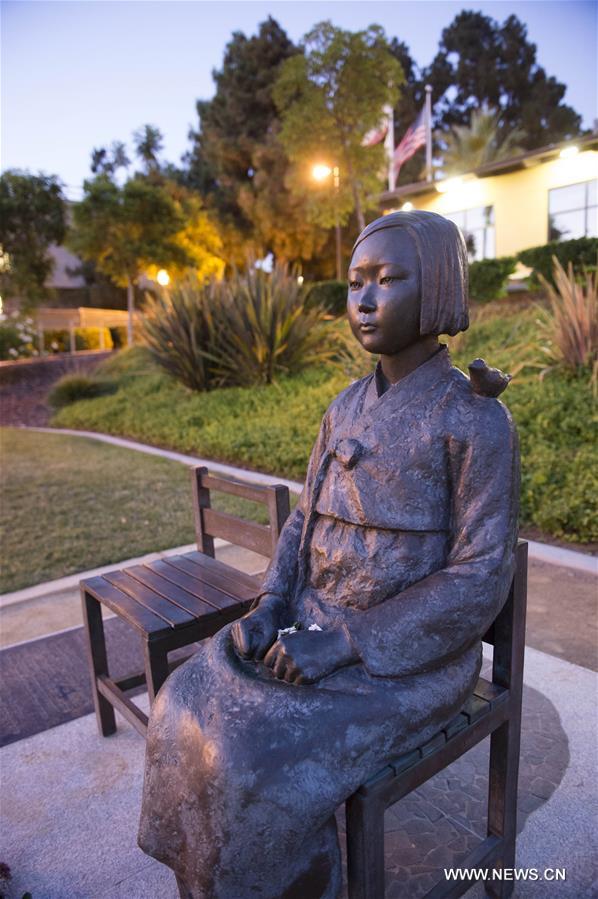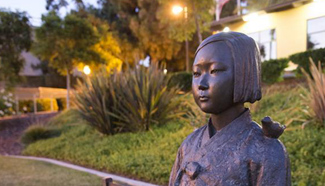
The memorial statue of Comfort Women is seen in the city of Glendale, southern California, the United States, Aug. 4, 2016. A U.S. appellant court Thursday dismissed a case against a memorial statue in Glendale, southern California, dedicated to victims of sexual slavery by the imperial Japanese army during World War II. (Xinhua/Yang Lei)
LOS ANGELES/SAN FRANCISCO, Aug. 4 (Xinhua) -- A U.S. appellant court Thursday dismissed a case against a memorial statue in Glendale, southern California, dedicated to victims of sexual slavery by the imperial Japanese army during World War II.
The statue was erected after the proclamation of "Comfort Women Day" by the city of Glendale on July 30, 2012, and the passing of U.S. House of Representatives Resolution 121 on July 30, 2007, urging the Japanese government to accept historical responsibility for war-time crimes.
Michiko Shitota Gingery, a Japanese-American, sued the city of Glendale and called for the city to remove it, alleging it exceeds the city's power and infringes upon the federal government's power to conduct foreign affairs. She was joined by several members of Japan's House of Representatives.
Judge Kim McLane Wardlaw of the U.S. Court of Appeals for the Ninth Circuit, which chambers in Pasadena, California, wrote in the ruling that the statue meant to advocate against "violations of human rights" and therefore was "well within the traditional responsibilities of state and local governments."
"Here, by dedicating a local monument to the plight of the Comfort Women in World War II, Glendale has joined a long list of other American cities that have likewise used public monuments to express their views on events that occurred beyond our borders."
In the 23-page ruling, Judge Wardlaw agreed with the finding in late 2014 by the U.S. District Court for the Central District of California about the case that "plaintiffs had not plausibly claimed that Glendale' s actions were preempted under the foreign affairs doctrine," and "the district court properly dismissed Plaintiffs' preemption claim."
Following Glendale's suit, Board of Supervisors of San Francisco voted unanimously in September 2015 to pass a resolution urging the creation of a comfort women memorial. Once erected, it would be the first major U.S. city to have one.
The U.S.-based Global Alliance for Preserving the History of WWII in Asia, a world-wide consortium dedicated to disclosing truthfully the facts about the Asia-Pacific War in 1931-1945, issued a statement applauding the appellant court's ruling.
During the district court's proceedings, the Global Alliance submitted an Amicus Curiae Brief in May 2014 to assist the court in deciding whether to dismiss or proceed with the case.
The organization said on Thursday that the appellant court's decision strengthens its "continuous call on the government of Japan to squarely face its responsibility and to bring a proper closure to this tragic chapter in history without further delay."
During World War II, Japanese forces enslaved more than 200,000 Asian and Dutch women who were removed from their homes in Korea, China, the Philippines, Thailand, Vietnam, Malaysia, East Timor and Indonesia before the war ended in 1945.











